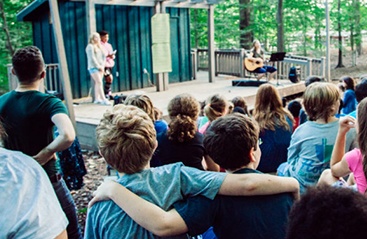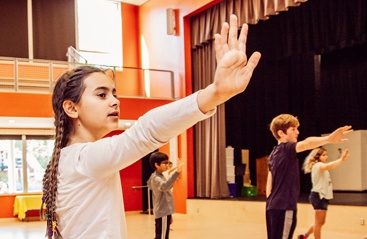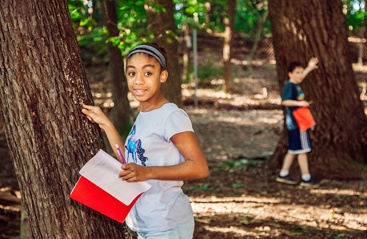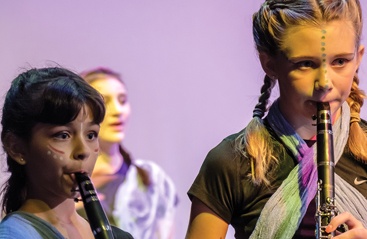Burgundy and the Ultimate ‘Essential Question’: What to Teach
Several years ago, Burgundy began framing its curriculum around the concepts of essential questions and enduring understandings. Essential questions, used by effective teachers for years and popularized in a program called Understanding by Design, simply stated, are part of a backwards-planning approach. We work toward enduring understanding (learning for life and future education) by helping students explore generative questions that cut at the essence of learning.
By exploring content through the lens of essential questions – that is, the questions that are most essential to understanding what’s important (and, best of all, helping students generate and answer their own questions) – we can promote learning as a process of discovery, an adventure that engages students’ innate curiosity. In this way, learning is not necessarily a static body of knowledge, but rather an exploration of topics and problems that leads to broader and deeper understanding and potentially many conclusions and lessons.
When Washington-area heads of school gathered in October for our annual IE (Independent Education) Heads Conference and some learning for ourselves, our learning focused on the questions of what we teach and why. We were fortunate to hear from several leading researchers with Harvard University’s Project Zero, who have been studying the development of learning processes since 1967. One of the most important points made early on in the conference, one that resonated with many heads was this: we are educating for the unknown!
The reality is that in a more globalized, networked, informed, multi-ethnic society and world community, it is hard to know what will be relevant and useful in a most enduring way in preparing students for what’s ahead.
A few years back, many of you may recall, came a provocative suggestion:
We are currently preparing students for jobs that don’t yet exist, using technologies that haven’t been invented, in order to solve problems we don’t even know are problems yet.
– Karl Fisch, “Did You Know?”
While this thought and its accompanying multi-media presentation at the time was interesting and a sort of catchy epiphany, today we take the truth of it for granted: there is so much we cannot anticipate about the near-future, much less the distant future.
So, what to teach? We will continue to teach many of the basics of the ‘3 Rs’ – reading, writing and arithmetic — but what beyond that? Here’s a perfect example of choices we may need to make…If we are teaching science, which is a better ‘investment’ as a content choice: mitosis or communicable diseases?
Many of us recall learning about mitosis, or cell division, a fundamental piece of the study of biology. But what about the study of communicable diseases, in comparison? One might learn a lot more by studying how disease spreads and how the spread of disease fits in with so many other societal and environmental issues; in fact, the interconnectedness of biology and medicine, social studies, human behavior, medical research, pharmaceuticals, government policies and economics, and more comes quickly into play with the study of communicable diseases. Thus, a strong case would be made that while cell division is an important concept, there is much more learning to be had in the study of communicable diseases.
We are looking, really, at life learning versus a form of niche learning. The study of communicable disease is the study of a problem and leads to development of broadly applicable problem-solving skills.
David Perkins of the Project Zero points out that life-serving learning takes us beyond what we may generally consider ‘good learning.’ He offers six ‘Beyonds’…
Beyond Content: Content – and access to content – continues to grow all the time. Knowledge is temporal. The sheer volume of potential important content can be overwhelming. We should emphasize analysis and application of content learned and 21st century skills-based competencies like collaboration, critical thinking and problem-solving.
Beyond Local: The world indeed is smaller and more connected than ever before. The likelihood and demand that students in their futures will interact with people different from themselves and from different places in the world is much higher all the time. Students must be alert to and interested in global perspectives and problems, and issues that have an impact on diverse peoples and nations.
Beyond Topics: We must regard content as a tool and starting point for thinking/application, action – rather than an end unto itself. Hands-on learning and collaborative projects engage the ideas that learning is limitless and knowing how to learn and being interested in learning are most essential.
Beyond Prescribed Studies/Curriculum: Giving students choice and options nurtures their innate love of learning; because content is limitless, it is the engagement, reflection and application that matter most. Hence, we enhance learning when we personalize it, meeting the learner where he or she is and taking into account past learning and life experience and interests.
Beyond Traditional Academic Disciplines: When we encourage teachers to innovate and be creative, they find new ways to teach and learn, and learning carries further. We don’t have to be artificially curtailed by old labels that apply to content-focused curriculum. At Burgundy we have long realized that much of the most important, foundational learning is social-emotional as well as intrapersonal and spiritual. Moving about the Alexandria campus independently, and learning in Nature, and from one another, both on the Alexandria campus and on our 500-acre BCWS campus, inspires academic and personal growth to last a lifetime and help students begin to understand their place in the world.
Beyond Discrete Disciplines: We are in the age of interdisciplinary studies. Real learning (and real-world problems) stretch across traditional disciplines; hence, we seize opportunities to work across curricular lines and to integrate work in language arts and social studies [see Burgundy’s Middle School humanities course and Lower School thematic units] as well as math and science and the arts.
These six ‘Beyonds’ indicate how learning today must differ from traditional learning. Burgundy has long bought into much of the thinking that Project Zero’s Perkins is espousing here. We continue to challenge ourselves to ask questions about what is most essential for students to be prepared for high school and far beyond, and how best to facilitate learning and personal growth to send our students toward their futures prepared, confident, and engaged as learners and citizens – in their schools, in their communities, and in their increasingly connected world!
Inquire Now
Burgundy is a one-of-a-kind independent school for Junior Kindergarten through 8th Grade. We believe children learn best in an inclusive, creative, and nurturing environment that engages the whole child.
3700 Burgundy Road
Alexandria, VA 22303
703.960.3431
Accredited by: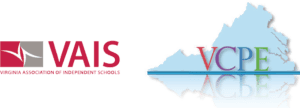
Affiliated with: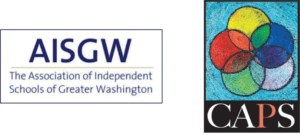
Partners with:
©2025 Burgundy Farm Country Day School
Designed and developed by The Design Channel![]()

